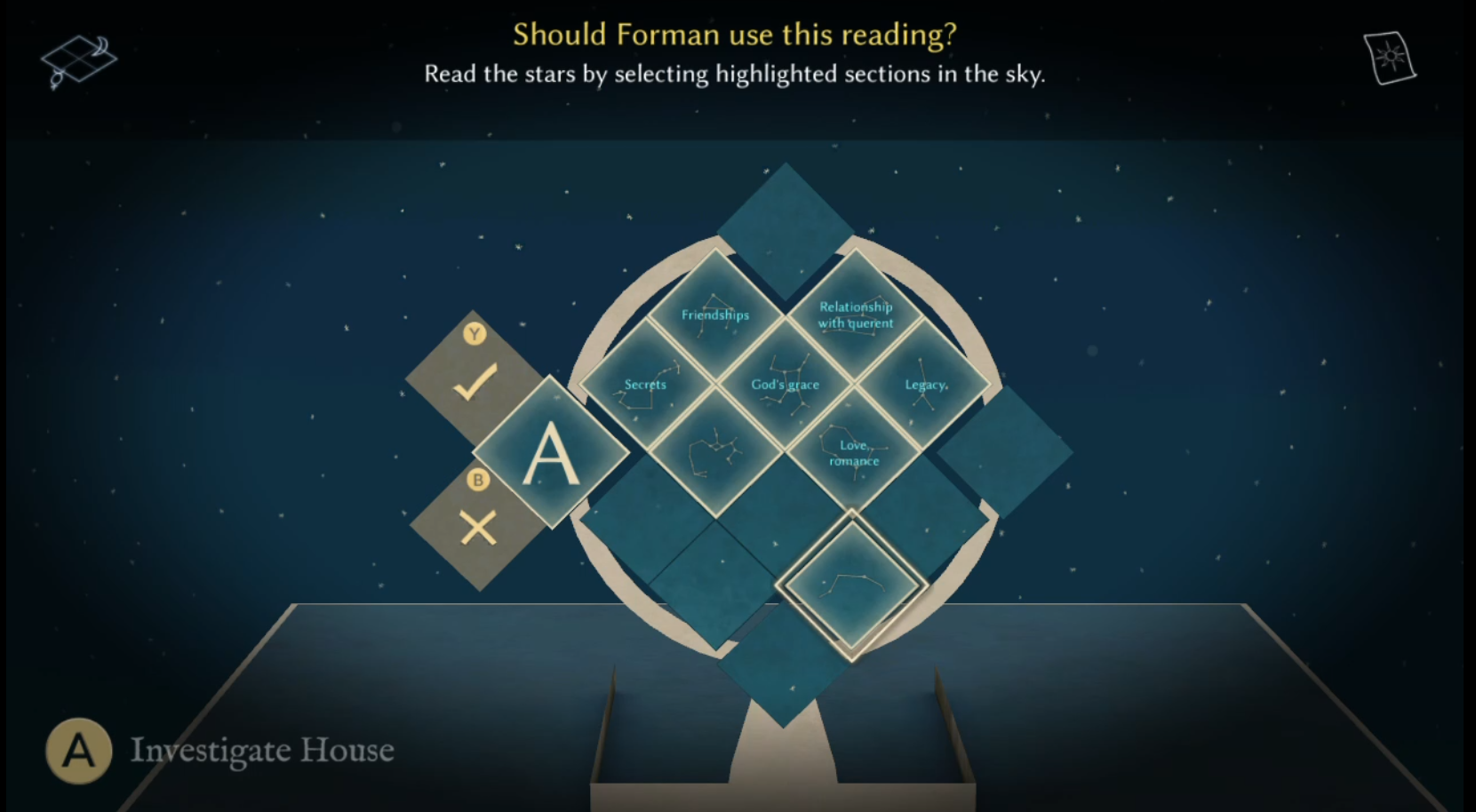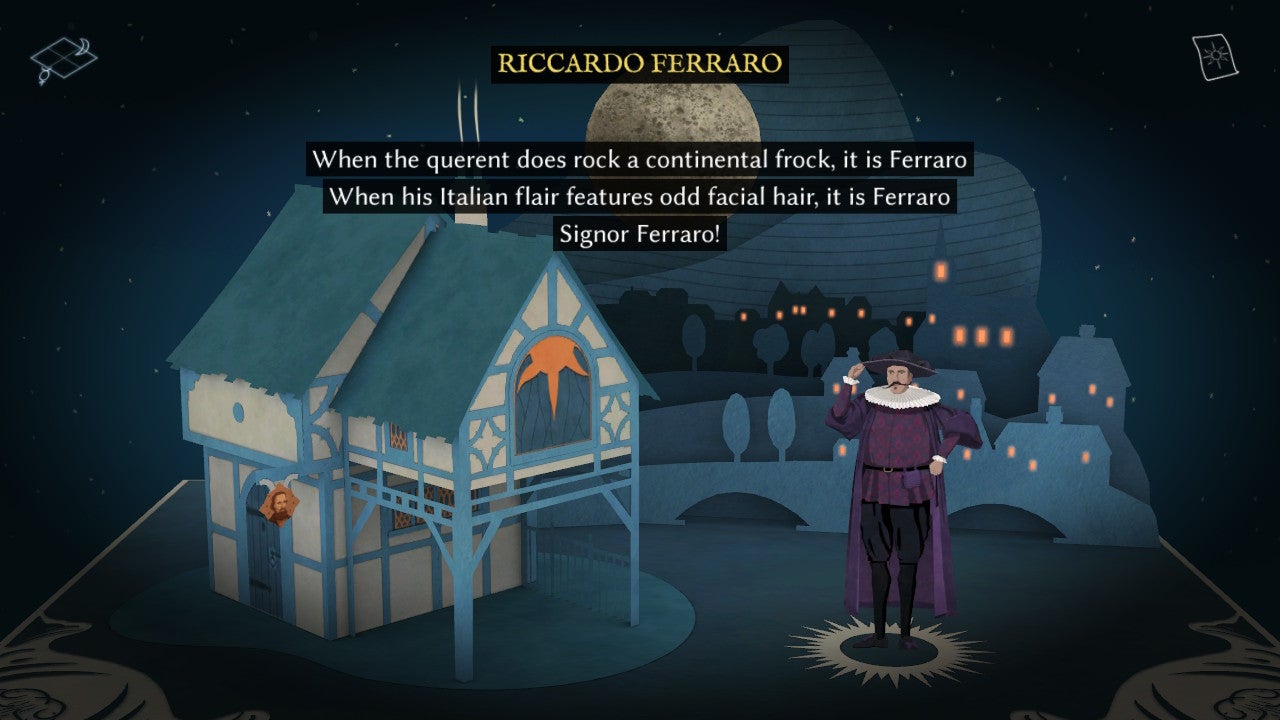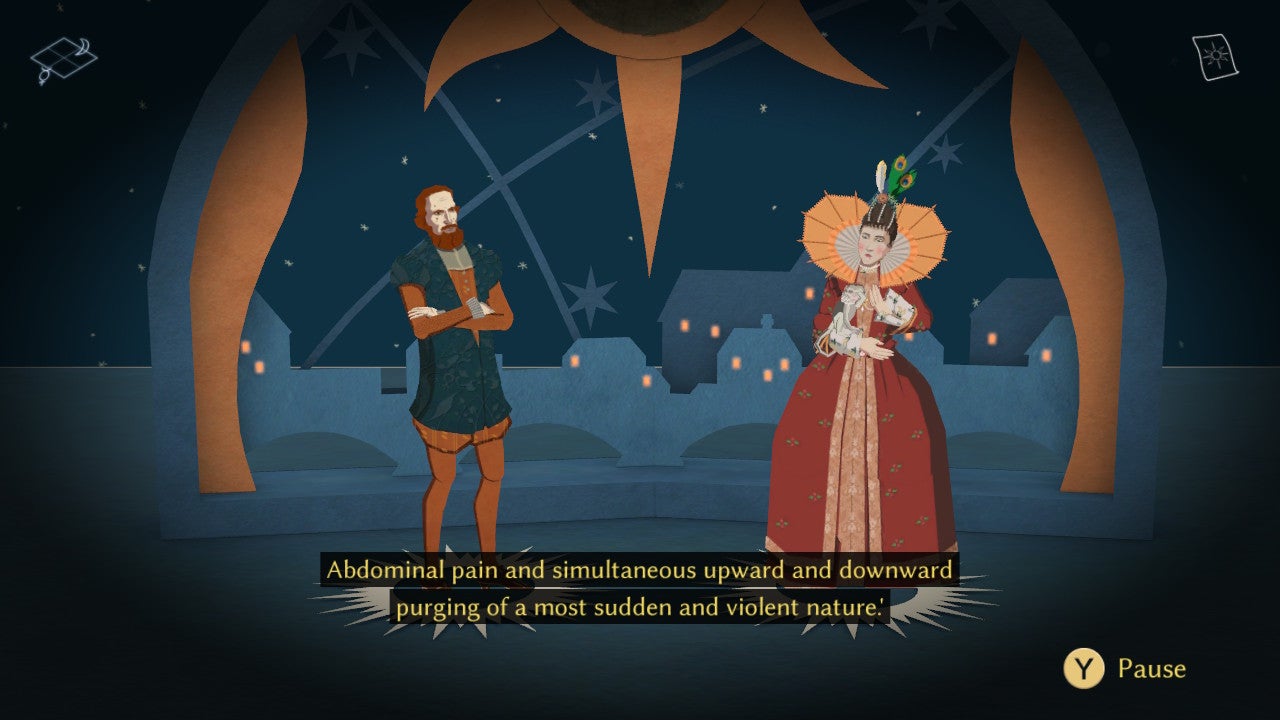By comparison, Astrologaster really doesn’t care about you all that much. If I have to call it anything, I want to call it a play, set in 1592. It takes place on a stage, with characters in a scene standing on marks, the city background like something crafted from wood painted in bright colours, each scene beginning with you unfolding the stage like a pop-up book, which is especially charming on the Switch when you slowly drag your finger across the screen instead of using the shoulder buttons to flip the page. Since it’s set in the Elizabethan era, it also features authentic theatre music of the time, complete with the ever-delightful lute and a choir singing Madrigals. You follow the story of Simon Forman, a real-life astrologer and physician who was well-known in Shakespeare’s social circle. The in-game Forman gains considerable acclaim by curing the plague by divining a cure from the stars, and from then on receives a colourful cast of patients in his clinic. This is where you come in - instead of taking control of Doctor Forman, you’re essentially an oracle, playing the part of the stars Forman reads. A patient will describe their symptoms, and Forman will ask you for a cause. You then make a choice between different constellations, each shown with an interpretation that may or may not fit your querent’s situation. Players not actually being omniscient is what makes divination in Astrologaster fun and frustrating in equal measure. I venture that with the descriptions provided for each constellation, you can guess a patient’s illness with little to no problem, but it becomes more difficult the more personal their questions get. In a few cases, I literally used history as my guide, which was fun because it showed me that life really does write the best stories sometimes. There’s no punishment as such for choosing the wrong reading, other than a patient being unhappy with the result, but to give the game a goal you’re asked to make each of them happy enough that they will give Forman a letter of recommendation and thus legitimise his practise. Unhappy querents equals no letter of recommendation, equals you being booed out of London as a quack. Or so I presume, while I didn’t get every possible letter, I’m going out on a limb to say some of them are pretty hard to miss. At certain points in the game, the college of physicians will try to thwart your plans. In these sections, not knowing the consequences of failure was unexpectedly stressful, especially since the game doesn’t give you the option of a failsafe by letting you save manually ahead of a consultation. But failure, or sometimes even lying to a querent, is a mechanic, too. These days, we don’t think much of astrology since we have no proof. In rare situations, failure, or letting a patient hear what they want to hear rather than what would be correct, can be the preferable outcome - like eating fortune cookies until you get a good fortune. From a hostess accidentally poisoning her dinner guests with raw potatoes to a dean who uses astrology as his version of stock market predictions, the stories accurately depict the old and the new. On one hand, you have the gossip and the haughty behaviour we associate with 16th century nobles. On the other, we have stories that seem to be transplanted directly from modern times. The story of Emilia Lanier for example, is one of a woman constantly objectified and being mansplained to, and it’s a true story to boot, proof that even with centuries of progress some things haven’t changed. Another patient’s story hits markedly different in 2021 than it did back in 2019 when Astrologaster first released. A hypochondriac comes to visit Forman’s practice, worried about dying from something or other he just heard about, then immediately suggests a treatment because he read about it somewhere. After a year of people playing virologist on my social media feeds, I really feel like Astrologaster divined the future on that one. I really enjoy Astrologaster’s more subtle form of humour. Other recent games to me feel as if they’re trying really hard to make you laugh. There is nothing wrong with that, but I enjoyed how Astrologaster startled a laugh out of me more than once simply through Katharine Neil’s writing being so biting. The best comedy is often that which just dryly looks at a situation without embellishment, and Astrologaster often simply seems to pick a version of that one ridiculous person we all know as a patient and lets them be their ridiculous self to great effect. I have to mention one more thing which is near and dear to my heart and another reason for the great love I have for this game: the choir. Each querent in Astrologaster gets introduced with a polyphonic madrigal. The texts are really funny descriptions of the characters and the situation they’re in when they visit you, and the songs, written by Andrea Boccadoro, are simply beautiful. It’s such a great attention to detail and to the time period - can you name another game in which each character gets their own madrigals? I can really heartily recommend Astrologaster. It’s the kind of game that fits perfectly on the Switch, its setup is truly unique, and it even stands out among the already small number of comedy games. The best about it is that there are no heroes here, just humans - delightfully flawed, hapless humans.



